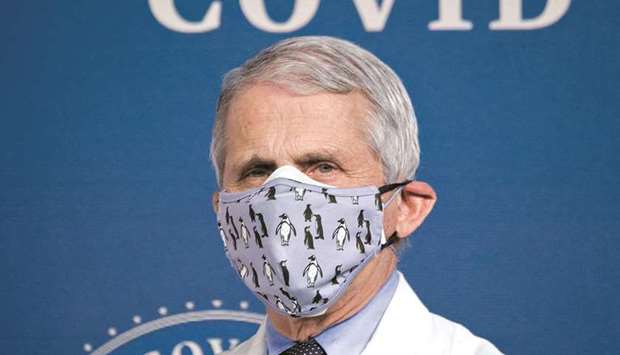The United States is closer to getting the coronavirus (Covid-19) pandemic under control and health officials are focused on the next challenge: getting more Americans vaccinated, the White House Covid-19 response coordinator Jeff Zients said yesterday.
“I would say we are turning the corner,” Zients said in an interview with CNN’s State of the Union.
He said that about 58% of American adults have received at least one coronavirus vaccine shot.
The task now is to continue building confidence in vaccines and get enough Americans vaccinated to mitigate the spread of the virus and its variants, he said.
US health officials are aiming to meet Democratic President Joe Biden’s goal of 70% of American adults having at least one shot by the July 4 US Independence Day.
Zients said reaching that goal could help the country reach a sustainable low level of infections.
About 46% of all Americans have received at least one coronavirus vaccine shot, according to the Centres for Disease Control and Prevention (CDC).
Dr Anthony Fauci, the director of the National Institute of Allergy and Infectious Diseases, meanwhile said that another surge in coronavirus infections would be unlikely if the Biden goal is met or exceeded.
“The larger proportion of the population that’s vaccinated, the less likelihood that in a season like the coming fall or winter you’re going to see a significant surge,” Fauci said on NBC’s Meet the Press. “That’s the reason why vaccinations are so important. That’s the wild card that we have now that we didn’t have last fall or the last winter.”
Fauci also said that there is “no doubt” that the US been undercounting fatal cases.
The country has officially lost over 581,000 people to the disease caused by the Sars-CoV-2 (the official name of the coronavirus) – but a University of Washington study released on Thursday estimated deaths at more than 900,000.
“That’s a bit more than I would have thought the undercounting was,” Fauci told NBC. “But I think there’s no doubt ... that we are, and have been, undercounting.”
The United States has reported over 32.6mn cases since the virus was first identified at the end of 2019 in China.
America was battered by a spike in cases and deaths after the end-of-year holidays, but since January new infections have come down as vaccination rates have jumped.
Zients has also defended the latest masking guidelines from the CDC, which recommends that fully-vaccinated people should still wear masks at crowded outdoor events or when they go indoors in public settings with other people who may not be vaccinated.
Some health experts have questioned whether the CDC guidelines are too strict, and that removing the indoor mask mandate for fully vaccinated people could encourage confidence in the vaccines.
That move would not, however, protect unvaccinated people from contracting the virus from a carrier who has been vaccinated.
The CDC guidelines will over time allow more people to take off their masks, Zients said in the interview with CNN, while acknowledging Americans’ mask fatigue.
“We’re getting there,” Zients said. “And the light at the end of the tunnel is brighter and brighter. Let’s keep up our guard.”
Commerce Secretary Gina Raimondo meanwhile said yesterday that many Americans are still struggling to return to work after the coronavirus pandemic, and last week’s lower-than-expected jobs numbers were a reflection of that.
“I think we have a long way to go to recover from the pandemic,” she said on CBS’s Face the Nation programme.
“There are so many Americans still struggling” and 8mn fewer jobs than there were before the pandemic, she said.
US job growth unexpectedly slowed last month, likely restrained by shortages of workers and raw materials.
Non-farm payrolls increased by only 266,000 jobs, well below the nearly 1mn jobs economists expected and a sharp contrast to steady increases in growth from January to March.
“We are making bold moves, but there’s a long way to go and we have to be there to help Americans find jobs,” Raimondo said of efforts by the Biden administration to boost the economy.
Women have been particularly hard-hit during the pandemic as many are clustered in industries hit hardest – lower-skilled service jobs, she said.
Lack of affordable child care also hits women hard, and with schools closed their choices were curtailed further.
Raimondo rejected some Republicans’ contention that people are reluctant to return to work because they are receiving unemployment insurance, saying nothing in the data suggests that.
“The number one reason now that people aren’t going back to work is what you said: fear. Or if they can’t find childcare or schools are still closed,” Raimondo said.
She said on Friday that the shortage in semiconductors was a factor in April’s jobs report, and yesterday she said she is focused on finding ways to produce them in the United States to avoid similar supply disruptions in the future.
Biden’s jobs package calls for a $50bn investment into the supply chain to make the country less vulnerable, she said.

Fauci: The larger proportion of the population that’s vaccinated, the less likelihood that in a season like the coming fall or winter you’re going to see a significant surge.
